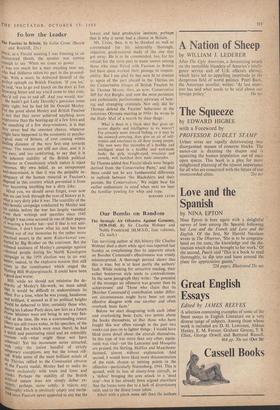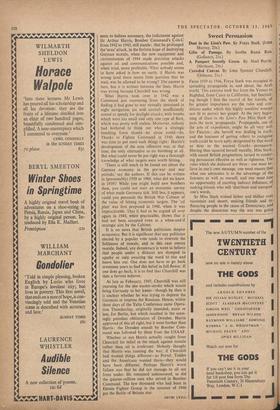Our Bombs on Random
The Strategic Air Offensive Against Germany, 1939-1945. By Sir Charles Webster and Noble Frankland. (H.M.S.O., four volumes, 42s. each.)
THE surviving author of this history (Sir Charles Webster died a short while ago) was reported last Sunday as complaining that its apparent attack on Bomber Command's effectiveness was widely misinterpreted. A thorough perusal shows that this is true, but is at least partly the authors' fault. While making for attractive reading, their rather boisterous style tends to contradictions. In the same paragraph they write: 'the potential of the strategic air offensive was greater than its achievement' and 'Those who claim that its [Bomber Command's] contribution under differ- ent circumstances might have been yet more effective disagree with one another and often overlook basic facts.'
Before we start disagreeing with each other and overlooking basic facts, two points about the books themselves, so that those who have fought this war often enough in the past two weeks can pass on to lighter things: I would have liked more detail about the aircraft themselves. In this type of war more than any other, equip- ment was vital—yet the Lancaster and Mosquito are praised, the Stirling, Halifax and Manchester damned, almost without explanation. And second, I would have liked more documentation of the raids chosen as turning points in the offensive—particularly Nuremberg, 1944. This is quoted, with its loss of ninety-four aircraft, as a 'defeat' bringing the area attack to a 'dead stop'—but it has already been argued elsewhere that the losses were due to a lack of diversionary raids and to the direct route taken.
Albeit with a pinch more salt than the authors
seem to believe necessary, the indictment against Sir Arthur Harris, Bomber Command's C-in-C from 1942 to 1945, still stands: that he prolonged the `area' attack, in the forlorn hope of destroying German morale, when the new equipment and circumstances of 1944 made precision attacks against oil and communications possible and, when tried, more profitable. What nobody seems to have asked is how on earth, if Harris was wrong (and there seems little question that he was), was he allowed to be wrong? The answer is here, but it is written between the lines. Harris was wrong because Churchill was wrong.
What Harris took over in 1942 was a Command just recovering from the shock of finding it had gone to war virtually untrained in night navigation, yet with aircraft insufficiently armed or speedy for daylight attacks; with bombs which were too small and only one type of flare, which was pretty well useless. Moreover, nobody had bothered to think out what a strategic bombing force should—let alone could—do. Thanks to Fighter Command in 1940, there was time to put most such things right: Harris's development of the area offensive was, at that time, the 'only alternative to no bombing at all. But what could never be put right was a thorough knowledge of what targets were worth hitting.
`There is still much to be found out about the German economy in the pre-war and war periods,' say the authors. If this can be written in (presumably) 1959 or 1960, what did we know in 1939? While you might build new bombers then, you could not start an economic survey of what made Germany tick. Still less, it appears, could you persuade the British War Cabinet of the value of hitting economic targets. The 'oil plan' was first proposed in 1940, when it was impracticable. That it had to be argued all over again in 1944, when practicable, shows that it had not been accepted even as a when-and-if strategic aim by the Cabinet.
It is no news that British politicians despise economics. But it is significant that any politician elected by a popular vote tends to overrate the fickleness of morale, and in this case enemy morale. Indeed, any democracy is wont to believe that people under a dictator are slumped in apathy or only awaiting the word to rise and heave him out. One does not have to go back seventeen years to find this belief in full flower. If one does go back, it is to find that Churchill was then a fervent believer.
As late as February, 1945, Churchill was still yearning for the one master-stroke which would bring Germany to her knees—though by then it is unclear whether he was trying to depress the Germans or impress the Russians. Hence, within three days of the Yalta Conference came Opera- tion Thunderclap, originally intended, more or less, for Berlin, but which resulted in the seem- ingly pointless obliteration of Dresden. Harris approved of this all right, but it went further than Harris: the Dresden assault by Bomber Com- mand was followed by three from the USAAF.
Whether or not Harris actually caught from Churchill his belief in the attack against morale rather than oil is irrelevant. Nobody thought that Harris was running the war; if Churchill had wanted things different—as Portal, Tedder and the Americans wanted them—they would have been different. Perhaps Harris's worst failure was that he did not manage to oil out from under. He remained unhonoured, as did the quarter-million men who served in Bomber Command. The few thousand who had been in Eleven Fighter Group in the summer of 1940 got the Battle of Britain star.
GAVIN LYALL







































 Previous page
Previous page